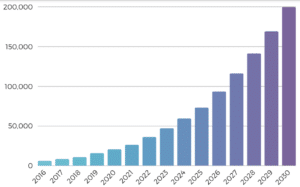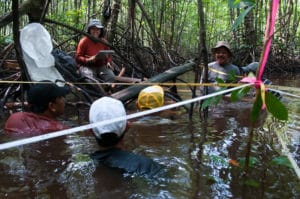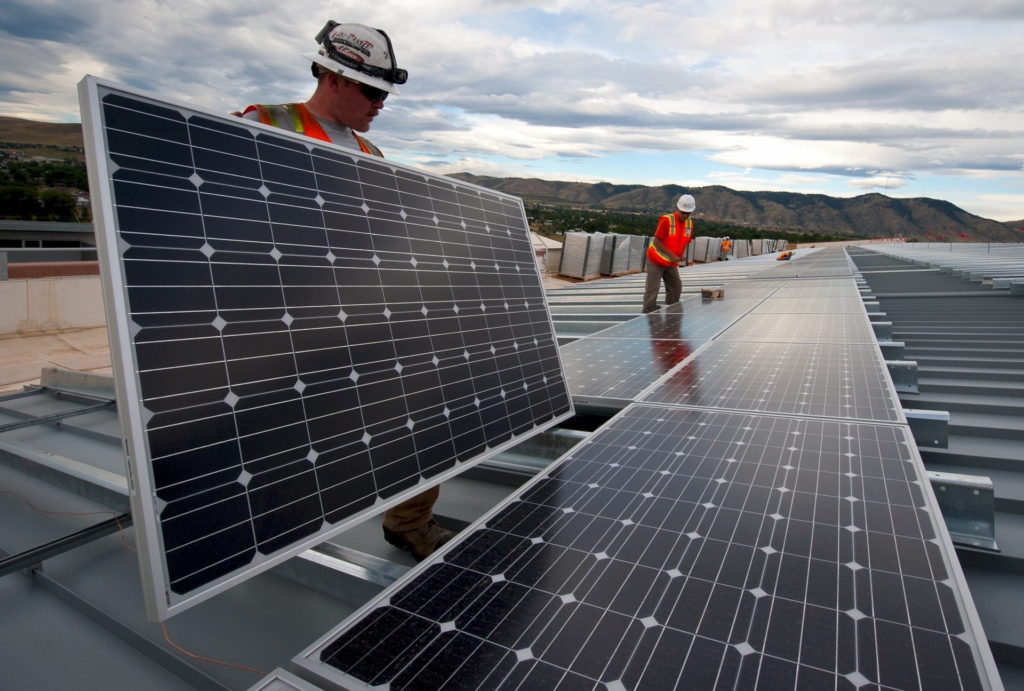The Paris Agreement sets out a goal for the world to reach net-zero emissions by 2050, a target that would make our economies vastly more sustainable and efficient. But what would a net-zero economy really look like? Such an economy by definition calls for a massive transformation of our systems in energy generation and transportation, as well as how we interact with nature. While the material lifestyles of average people in a net-zero economy will not change dramatically, the jobs on offer will be drastically different. What do net-zero economy jobs look like, and what will the transition to net-zero mean for the workers of the future?
—
A net-zero economy will no longer rely on coal plants, oil refineries or factory farms, as solar farms, wind farms and regenerative agriculture and husbandry take their place. But this transition will touch every sector of the labour market, at times in some very surprising ways.
Decoupling from fossil fuels means decoupling from a way of life we have grown accustomed to over two centuries. Since we began burning them, oil, coal and natural gas have been driving the global economy and have come to define how we live our lives, buy our things and interact with the world. Our jobs are no different. Even if you do not work in a coal plant, there is a high likelihood that your career is in some way tied to fossil fuel extraction or production, or at least supported by it. Like many other things in life, decarbonisation and eventual net-zero will change the way most of us work.
There is no reason to believe employment opportunities will be diminished in a decarbonised economy, as it is becoming increasingly clear that a green, net-zero economy will be flush with new jobs for workers to explore. These jobs will certainly be different, and there will be a transitional period of disruption, with potential short-term unemployment shocks and low supply for the jobs on offer, but net-zero does not mean zero jobs.
Disruption can mean many things, but it rarely means permanent unemployment. It can involve any degree of retraining or redirecting workers’ energies and capabilities, and by no means will have a net negative effect on job availability. If innovation and technology play a role, then there is a good chance that disruption will make livelihoods on average a little more comfortable. The fact that it can also clean up our environment and our atmosphere doesn’t hurt either.
Disruption must not be looked at with passivity or trepidation, but with preparedness. The transition to a net-zero economy will primarily affect the most carbon-intensive sectors of today: energy and transportation. But what will these transformations look like? How will renewable energy, electrification and all the other components of a sustainable net-zero economy affect the future of our jobs?
Transforming Energy
The most obvious impacts of a transition to a net-zero economy will be in the energy sector. Net-zero must absolutely entail a decisive and uncompromising abandonment of fossil fuels as our main sources of power generation, accompanied by a shift to sustainable and low-cost renewable energy alternatives.
This will be a dramatic shift in how we humans live our lives. For centuries, our modern comforts of life have been enabled by extracting hydrocarbons preserved in the Earth and then combusting them to generate electricity But electricity generation contributes to 25% of global emissions, mainly because we still receive 64.5% of our electricity from burning fossil fuels, so a full transition to renewable energy will be necessary in a net-zero economy.
This means transitioning from using the finite resources in the ground, towards taking advantage of the clean, self-replenishing ones we have in our skies. Solar and wind energy are the fastest growing renewable energy sources, and may already be generating around one tenth of the world’s electricity. Other renewable energy sources, like geothermal and hydropower, are poised to complement solar and wind in replacing fossil fuels.

Renewable Energy Job Growth 2018-19/Source: American Council on Renewable Energy.
Clean energy jobs are already flooding economies. While around half of the nearly 58 million people worldwide employed in the energy sector still work in the fossil fuel industry, renewable jobs are by far the fastest growing. The International Renewable Energy Agency (IRENA) estimates that around 11.5 million people worldwide were already working in the renewable energy sector in 2020, an increase from around 10 million in 2018. Fossil fuel jobs, meanwhile, are shrinking tremendously. Coal mining, for instance, lost 58% of jobs between 1980 and 2015. And in some countries, such as the US, clean energy already employs more people than fossil fuels.
Conventional renewable energy jobs, including technicians, construction workers and engineers who can install and maintain solar panels and wind turbines, are booming in demand, accounting for some of the fastest growing jobs in the US. But to support renewable energy infrastructure and grids, the net-zero job market will inevitably spill over into other sectors.
Financial services careers will still be in high demand, but the most popular finance professions will be those that support net-zero transitions. Emissions and environmental auditing is a growing field that will entertain many high-paying and ecologically sustainable careers. As more and more companies decide to go carbon-neutral, either voluntarily or incentivised to do so by governments or markets, there will need to be overseeing bodies that can evaluate whether businesses are complying with emission reduction targets, and can advise on how to do so if they are not. Climate Smart is a Canadian firm that is doing just this, advising companies on how to be carbon-neutral by mapping their emissions and helping transition to a more sustainable and often profitable business model.
As fossil fuels are progressively phased out on the way to net-zero, the types of jobs that can facilitate this transition will become much more prevalent. These will include firms and businesses that are specialised in removing industrial and hazardous pollutant waste, a profession that is expected to grow by over 17% in the US over the next decade. Environmental engineers and technology specialists who can implement more efficient systems to manage companies’ waste and eliminate sources of carbon-intensive pollutants will also be in high demand.
The transition to a carbon-free economy will entail job growth in any career that supports the expansion of renewable energy, whether that be in construction and maintenance of infrastructure, or in advising individual companies on reducing how much they emit and waste. Services that can help companies take these steps without losing substantial revenue will be in high demand.
You might also like: How To Improve Electric Transport in South-East Asia
The Future Is Electric
A net-zero economy is one that is powered by renewable energy, but also one that runs on fully electrified grids. While the energy sector is a massive contributor to global emissions, the transportation sector accounted for 29% of emissions worldwide in 2019, and to achieve any semblance of net-zero, the way we move has to transform.
Much like how the way we generate energy has been defined by fossil fuels, our methods of transportation over the past 200 years have also relied on burning these fuel sources. But in a net-zero economy, this cannot happen. Fortunately, the technology to electrify the way we move already exists.
The popularity of electric vehicles is skyrocketing, as more and more companies, both start-ups and well-established auto manufacturers, join the EV race. Global sales of electric vehicles increased by 43% in 2020, with an outsized amount of growth occurring in China, providing an ideal case study in how labour markets will adapt to an electrified future.
China’s goal for all car sales to be hybrids or EVs by 2035 has incentivised literally hundreds of competing companies to enter the electric vehicle fray, boosted by generous subsidies from the government. This has created a huge demand for engineers, factory workers and designers in the EV sector, although the supply of qualified workers in the existing labour market remains low, meaning that, despite the nascent stage of the industry, these jobs are already very high-paying professions.

Projected number of permanent jobs in Europe 2016-2030 based on EU’s targets for 2030 EV sales. Most new jobs will be tied to maintenance work, battery cell manufacturing and installation/Source: The European Association of Electrical Contractors.
EV technicians, and technicians servicing EV infrastructure such as charging stations, will be jobs with good pay, in high demand and rarely require a university education. Net-zero transportation careers will not be limited to private vehicles, as these same technicians will be required to work on electrified urban public transport and intra-city rapid transit systems. And electrifying transport need not be limited to land. Marine retrofitting is an expanding field, offering careers in repurposing freighters and tankers to run off hybrid engines or batteries. Corvus Energy, for instance, is a Canadian company that provides marine retrofitting for hybrid engines and battery generators to cruise ships, freighters and workboats, principally in Scandinavia.
Despite the promises of abundant and profitable jobs in the electrified transportation sector of a net-zero economy, it is important to remember that we cannot electrify our way out of the climate crisis. We cannot switch our cars, ships or even planes to run on battery power and hope that will be enough to reach net-zero emissions. This is because achieving net-zero will require a concerted shift in how efficient we are, and a marked change in how much we consume, not just in how we power the things we consume.
Even if electric vehicles were to fully replace internal combustion engines, that would not be true net-zero, since the impact of extracting rare Earth metals and the unavoidable environmental cost of manufacturing would still be high. In addition to phasing out fossil fuels and electrifying the transport sector where we can, we also need to make our cities smarter and more walkable, in ways that decrease the need for people to drive or own a car in the first place.
But even here, the net-zero economy promises to be a provider of bountiful employment opportunities. To make cities walkable means redesigning urban layouts, so that people never have to move further afield than their immediate neighbourhood to buy anything they might need or do anything they might have to. Redesigning city layouts and making them more efficient will be a major source of employment on the road to net-zero, and maintaining them will be equally important once we reach it.
Urban planners, architects and engineers will be in high demand to complete these tasks, as will any degree of specialisation in designing anything from complex metropolitan public transit networks to implementing a city’s first bike sharing system. Updating infrastructure will obviously be a key part of this transition, as cities must be filled with bike lanes, bus lanes, subway stations, pedestrian islands and greened areas, projects that will generate many clean construction jobs.
Electrified transportation should not occur at the expense of more efficient systems of living and moving. In a net-zero economy, job growth will be centred on essential transport infrastructure, which should be electrified as much as possible, but will also focus on making transportation in and of itself more efficient, healthy and with fewer redundancies.
Valorised Biodiversity
A net-zero economy needs a pristine and abundant environment. Natural carbon sinks, abundant biodiversity and healthy ecological services are the most efficient tools we have at our disposal to reach net-zero, and our jobs will reflect the importance of preserving these.
To preserve biodiversity, a net-zero economy must also be one that highly valorises natural capital. This would constitute a change in what our jobs are, but also in how many cultures around the world view the natural world. If we assume that a net-zero economy will place economic value on protecting nature, and that this value will adequately reflect how important preserving natural capital is to carbon neutrality, then perhaps conservation would not just be any average job, but a highly desirable and even honourable career to pursue.
A net-zero economy will focus on land regeneration, ensuring that we do not take more from the natural world than we need, and leave enough for resources to replenish themselves. The factory farms of today, for instance, would be incompatible with a net-zero world, given they are highly carbon-intensive and generate most of the world’s highly potent methane emissions, not to mention the ethical ramifications of running factory farms. Our methods of food production, and the jobs that this sector entails, will not stay like this in a net-zero economy.
Agriculture and husbandry will become much more localised, given that global trade and shipping account for 7% of total emissions. Since farms will be much more reliant on local resources and capacity, regenerative practices will become the norm. The agroecology career track will become well suited to this new trend in farming practices, a field that explores the use of regenerative ecological processes to support farms, rather than industrial or chemical ones. These could include the use of cover crops, regenerative grazing, raising farm animals for natural pest control or revitalising indigenous agricultural practices. Workers or managers who specialise in one of these areas will be in high demand.
For the net-zero economy workers who lack a green thumb but still appreciate conservation and the outdoors, the employment options will still be plentiful. Humans may have transformed up to 70% of the natural world in our quest to make life more comfortable for ourselves, and we will need to rewild much of these appropriated environments to account for the biodiversity needs of a net-zero economy.

Workers rehabilitating and studying plant biomass in an Indonesian mangrove forest/Source: Center for International Forestry Research; Image sourced through Flickr.
Jobs in wilderness and wildlife restoration are already relatively easy to find, but will be in much higher demand as the net-zero economy edges closer. Ecological restoration skills that can help animals and plants reclaim their habitats will be highly valued in this emerging field, as will environmental engineers knowledgeable in rewilding procedures. Those proficient in history, especially local indigenous history, will attract high interest, since conservation methods derived from indigenous groups are often the most effective, tried and tested environmental stewardship practices.
In addition to helping us build and maintain a cleaner, more sustainable world, these jobs will likely improve mental health and overall wellbeing. The same is true of professions in the energy and transport sector, since reducing emissions and eliminating pollutants has a direct effect on improving health standards and public happiness.
While jobs in all these diverse sectors of a net-zero economy will help make our world cleaner, the greatest benefit may lie in how much more fulfilling our work will be. Profit motives will still exist, of course, otherwise they wouldn’t be jobs, but salaries will not be the only factor motivating people to get out of bed every morning and go to work. In the US, over half of workers feel dissatisfied with their jobs, largely due to a lack of direction or purpose. In a net-zero economy, every job will be directly or indirectly tied to keeping emissions down and making our world a better, more liveable place. And that is work that people can take pride in.
Featured image by: Pxfuel


















